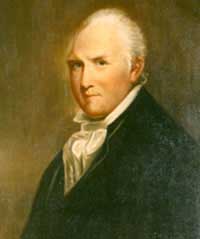An Educator and Minister to the Souls of Young and Old
Arriving at the Mason-Dixion line dividing Virginia from Pennsylvania in 1861, Dr. George Junkin and his family stopped their carriage carrying all their worldly possessions. In an act of more than a symbolism, Dr. Junkin cleaned off of his boots and the horses hoof’s all the Southern mud, wanting to make sure that none of the Rebel dirt would be carried into the Union North.
The Rev. Dr. George Junkin was born on November 1, 1790 outside the small village of New Kingstown, Pennsylvania. The sixth son of Joseph Junkin, who was a ruling elder in the Junkin Tent congregation of the Covenanters in central Pennsylvania, remained on the farm of his parents at first. Educated in private schools in Cumberland County, he was sent first to Jefferson College in western Pennsylvania, graduating from there in 1813. He then attended the Associate Reformed Presbyterian Theological Seminary in New York and became a Covenanter minister. For eleven years, he was the pastor of two Pennsylvania churches of that denomination. In 1822, he transferred into the Presbyterian Church in the United States of America, and became a leader in the Old School Presbyterian Church. He was accorded the honor of being Moderator of the 1844 General Assembly of the PCUSA.
The education phase of his ministry started in a small Manual Labor Academy in Germantown, Pennsylvania. He then became the first president of the brand new Lafayette College, building up that Presbyterian school into a fine educational facility. After a brief stint at Miami at Ohio College, he went down to Washington College in Lexington, Virginia from 1848 – 1861, resigning at 71 years of age.
Two of his daughters married Confederate officers. Elinor was the first wife of Thomas Jonathan Jackson, later Stonewall Jackson. She did not survive the birth of their first child, who also died. Another daughter married Confederate and later General D. Harvey Hill. A son, named after him, became a staff member of Gen Jackson’s headquarters, and was captured at Kernstown, Virginia, by Union forces. So, as it was in so many families of the War Between the States, their allegiances were in two different nations.
Returning to the North, Dr. Junkin in the last seven years of his life preached seven hundred sermons, many of them to Union soldiers in their camps. He visited wounded Union soldiers in hospitals. He went to be with the Lord in May of 1868 in Philadelphia, Pennsylvania.
It was unique that near the end of the century, his coffin was dug up and sent south for re-burial in the Stonewall Jackson Memorial Cemetery outside Lexington, Virginia.
Also this day:
The Associate Reformed Presbyterian Church was formed by union of the Associate Presbyterians and the Reformed Presbyterians of America, meeting in Philadelphia on November 1, 1782.
Words to live by: Conviction, both religious and national, was part and parcel of George Junkin’s life. He knew what he believed and his actions reflected that to both friend and enemy. Of all the Junkin family, he was the most celebrated not only in that family, but in his generation. It is great to have a good name. Solomon wrote in Proverbs 15:1 “A good name is more desirable than great riches; to be esteemed is better than silver or gold.” (NIV) He is remembered, not only by the Junkin ancestors, but by Presbyterians everywhere. Let us seek to be known by our biblical convictions and have a good name.


 The Rev. John Mitchell Mason [1770-1829] was an Associate Reformed pastor who served for many years in New York City. He was born in New York City on March 19, 1770, and was the son of the Rev. John Mason, D.D., who had emigrated to this country in 1761 to take the pastoral charge of the Cedar Street Presbyterian Church in the New York City. John Mason proved to be a faithful pastor and remained in that pulpit until his death in 1792. William Sprague notes that “one of the noblest tributes which a son ever paid to the memory of a father, is to be found in the Address which Dr. Mason (the son) delivered before the Presbytery, relative to the resignation of his pastoral charge;—a tribute which no one can read without feeling a sentiment of veneration for the parent, and of admiration for the intellectual greatness and filial sensibilities of the son.” [perhaps we can relate some of that Address on another occasion.]
The Rev. John Mitchell Mason [1770-1829] was an Associate Reformed pastor who served for many years in New York City. He was born in New York City on March 19, 1770, and was the son of the Rev. John Mason, D.D., who had emigrated to this country in 1761 to take the pastoral charge of the Cedar Street Presbyterian Church in the New York City. John Mason proved to be a faithful pastor and remained in that pulpit until his death in 1792. William Sprague notes that “one of the noblest tributes which a son ever paid to the memory of a father, is to be found in the Address which Dr. Mason (the son) delivered before the Presbytery, relative to the resignation of his pastoral charge;—a tribute which no one can read without feeling a sentiment of veneration for the parent, and of admiration for the intellectual greatness and filial sensibilities of the son.” [perhaps we can relate some of that Address on another occasion.]